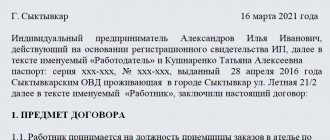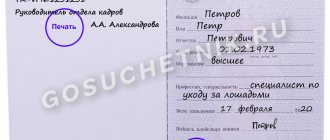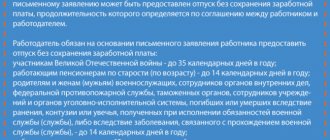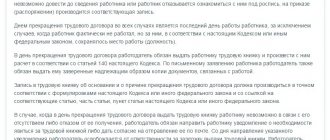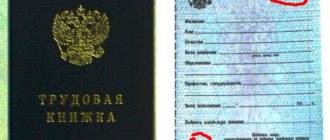Inspections conducted by the labor inspectorate are one of the types of inspections carried out by government agencies. The Labor Inspectorate oversees compliance with labor legislation and other regulatory legal acts containing labor law standards (part one of Article 353 of the Labor Code of the Russian Federation).
The rights and responsibilities of labor inspectors of state labor inspectorates are determined by regulations, which are best read in advance in order to understand whether the inspectors are not exceeding their rights during the inspection process and whether their actions are not violating the rights of the employer.
First of all, this is Chapter 57 of the Labor Code of the Russian Federation, federal law of December 26, 2008. N 294-FZ “On the protection of the rights of legal entities and individual entrepreneurs in the exercise of state control (supervision) and municipal control” (hereinafter referred to as Law No. 294-FZ), as well as the Order of the Ministry of Labor and Social Protection of the Russian Federation of October 30, 2012. N 354n “On approval of the Administrative Regulations for the execution by the Federal Service for Labor and Employment of the state function of exercising federal state supervision over compliance with labor legislation and other regulatory legal acts containing labor law norms” (hereinafter referred to as the “Administrative Regulations”). In addition, Convention of the International Labor Organization No. 81 on labor inspection (1947) and its Protocol (1995), Regulations on federal state supervision of compliance with labor legislation and other regulatory legal acts containing labor law norms, approved. Decree of the Government of the Russian Federation dated 01.09.2012 N 875, Methodological recommendations for the application by officials of state labor inspectorates of Law N 294-FZ, approved. by order of Rostrud dated January 24, 2011 N 14.
LABOR INSPECTION: CONDUCTING INSPECTIONS
Inspections can be scheduled and unscheduled (Articles 9, 10 of Law No. 294-FZ)
A planned inspection is carried out by the labor inspectorate at a certain frequency and only on the basis of an approved plan. An unscheduled inspection is carried out by the labor inspectorate, regardless of the time of the previous inspection, if appropriate grounds arise.
Scheduled inspections are comprehensive in nature and are carried out to establish the employer’s actual compliance with the requirements of labor legislation in general or individual norms, sections, for example, remuneration or dismissal procedures. An unscheduled inspection, unlike a planned one, is one-time in nature, as it is carried out based on requests from citizens (employees) about violations of labor laws by the employer.
We identify illegal actions of the labor safety inspectorate
Regardless of what labor inspectorate specialists check, when conducting an audit at an enterprise, they have not only powers, but also responsibilities. If the inspector in any way violated the regulations for conducting the inspection, it may be considered illegal, and the inspector in this case will be fined.
The most common reasons for declaring the activities of an inspectorate illegal :
- The inspector does not have an order in hand. During his visit to the enterprise, the inspector must present his identification and an order from the head of the State Inspectorate.
- If this document has not been presented, the employer has every right not to allow the inspector into the organization’s territory, and if the inspector has already managed to inspect everything and a fine was issued, this decision can be challenged in court. Based on practice, the courts in such situations most often side with the employer.
- There are no specific grounds; the complaint does not indicate a clear reason for the appeal. If control is initiated at the request of a company employee, but a specific complaint is not indicated in the appeal, then there are no grounds for this action, that is, if the inspection is carried out, it will be considered illegal.
- Deadlines. Any inspection has a maximum period (20 days, except in special cases), and the period established in the order. If the inspector exceeds the deadline, the actions may be regarded as illegal, and the GIT employee may be fined.
Procedure for assigning a check
The basis for conducting an inspection by the labor inspectorate in relation to a specific employer is the order of the manager (deputy manager), the standard form of which was approved by order of the Ministry of Economic Development dated April 30, 2009 N 141.
The order must indicate the following data (Article 14 of Federal Law No. 294-FZ):
- the name of the state labor inspection of the relevant constituent entity of the Russian Federation, as well as the date and number of the order;
- type and form of inspection carried out;
- name of the legal entity or full name of the individual entrepreneur;
- address(es) of the employer’s location (at this address the inspection will be carried out if it is an on-site inspection);
- Full name and position of the person authorized to conduct the inspection, as well as invited experts and representatives of expert organizations;
- the purpose and objectives of the inspection (if the inspection is unscheduled, then the details of the employee’s complaint are indicated).
- the subject of the inspection, the legal basis for its conduct, regulatory legal acts, the mandatory requirements of which are subject to inspection, and a list of control measures necessary to achieve the goals and objectives of the inspection;
- the duration of the inspection, as well as its start and end dates
- list of relevant administrative regulations;
- documents that must be submitted to the inspector for the inspection.
LEGAL SUPPORT OF ORGANIZATIONS
A copy of the order is certified by a seal and handed over to the manager (authorized person) against signature by the inspector conducting the inspection. The specified basis for conducting an inspection is the same for both scheduled and unscheduled inspections.
Tasks of the labor inspectorate
The main tasks and powers of the State Labor Inspectorate are described in Part 2 of Resolution No. 324. They include:
- Monitoring compliance with labor law standards by employers. It is carried out through inspections - scheduled and unscheduled.
- Supervision of compliance with the procedure for investigating accidents that occurred at work and recording them at the enterprise.
- Supervision over the implementation of social payments and state support to unemployed citizens and benefit categories by bodies vested with state power.
- Supervision of the activities of guardianship and trusteeship authorities regarding incapacitated persons.
- Consideration of collective labor disputes in state-funded organizations.
- Informing employees and employers on issues related to labor legislation.
- Conducting a state examination of working conditions for dangerous and harmful conditions in order to provide workers with compensation.
- Assessing compliance with labor safety rules at the enterprise.
However, there are differences between these checks.
| Scheduled inspection | Unscheduled inspection | |
| Grounds for appointment (issuance of order) | The annual inspection plan, posted no later than December 31 of the year preceding the year of scheduled inspections, on the official website (https://www.rostrud.ru) of the state labor inspectorate of the relevant constituent entity of the Russian Federation, as well as on the official website (https://plan.genproc. gov.ru/) of the Prosecutor General's Office of the Russian Federation on the Internet* | Citizens' complaints about employer violations of labor laws. The number of unscheduled inspections, unlike scheduled ones, is not regulated by law, since they are determined solely by the reasons for their conduct that have arisen** |
| Form of conduct | Documentary and traveling | Documentary and traveling |
| Period and procedure of notification | No later than 3 days before the start of the event. The form is not established by law; it can be by courier, fax, or mail. | No later than 24 hours before the start of the event. The form is not established by law; it can be by courier, fax, or mail. It is important that the inspector should not notify the employer about an unscheduled on-site inspection based on an employee’s complaint. |
The basis for inclusion in the annual inspection plan is the expiration of three years from the date (part 8 of article 9 of Law N 294-FZ, clause 35 of Administrative Regulation N 354n):
- state registration of a legal entity or individual entrepreneur;
- completion of the last scheduled inspection of a legal entity or entrepreneur;
- the commencement of entrepreneurial activity by a legal entity (individual entrepreneur) in accordance with the notification submitted to the federal executive body authorized by the Government of the Russian Federation in the relevant area on the commencement of certain types of entrepreneurial activity in the case of performing work or providing services that require the submission of the specified notification.
The grounds for conducting an unscheduled inspection are (the list is exhaustive):
- expiration of the deadline for the employer to fulfill the order issued by the state labor inspectorate to eliminate the identified violation of the requirements of labor legislation and other regulatory legal acts containing labor law norms;
- admission to Rostrud or the state labor inspectorate:
- appeals and applications from citizens, including individual entrepreneurs, legal entities, information from government bodies (officials of the federal labor inspection and other federal executive bodies exercising state control (supervision)), local governments, trade unions, from funds mass information about violations by employers of mandatory requirements, including labor protection requirements, which resulted in a threat of harm to the life and health of workers;
— an employee’s appeal or statement about the employer’s violation of his labor rights;
— an employee’s request to conduct an inspection of labor conditions and safety at his workplace in accordance with Article 219 of the Labor Code of the Russian Federation.
- the presence of an order from the head (deputy head) of the state labor inspection to conduct an unscheduled inspection, issued in accordance with the instructions of the President of the Russian Federation or the Government of the Russian Federation or on the basis of the request of the prosecutor to conduct an unscheduled inspection as part of the supervision of the implementation of laws on materials and appeals received by the prosecutor's office.
How to contact the labor inspectorate
In order to contact Rostrud with a complaint, the first thing you need to do is find in a directory or on the Internet the address of the territorial GTI department and the name of the inspector supervising the site where the enterprise is located.
Submit the complaint itself in writing in two copies.
If there are documents that indicate a violation of the employee’s rights, they must be attached to the complaint.
Submit a complaint to the territorial body of Rostrud in person or by mail using a registered letter. One copy remains with the inspector, and the second copy is marked with the acceptance of the complaint for consideration, number and signature.
After receiving the application, the State Tax Inspectorate must review it within 30 days and send an inspector to conduct an inspection of the enterprise.
According to the law (Article 358 of the Labor Code of the Russian Federation), the State Tax Inspectorate bodies do not have the right to disclose the name of the person from whom the complaint was received.
Check procedure
The procedure for conducting an inspection depends on its form. It can be documentary or visiting. The documentary form of the inspection means that the inspector will examine only the employer’s documents without visiting him. An on-site inspection also implies its conduct on the basis of documents and written information provided by the employer, but it will already take place at the employer’s location.
ACCOUNTING
During a documentary inspection, the inspector first examines the documents that are at his disposal, for example, reports of previous inspections or previously issued orders. In the absence or insufficiency of such documents for conducting an inspection, a request is sent to the employer with a requirement to provide the necessary documents, explanations and information in writing (clauses 49, 50 of Administrative Regulation No. 354n). The specific list of requested documents and information is determined based on the purpose of the inspection, as well as depending on the volume of documents already available to the labor inspectorate.
The employer is obliged to personally submit the requested documents in the form of copies certified by the seal and signature of the manager (authorized representative) along with all explanations no later than 10 working days from the date of receipt of the request (Part 5 of Article 11 of Law No. 294-FZ).
The submitted documents are usually examined by the inspector immediately in the presence of the employer. However, in some cases this may take several days. When the reliability of the information contained in the documents submitted by the employer raises reasonable doubts in the inspector, or this information contains errors or contradictions, the labor inspector requests additional explanations in writing, which must be submitted within ten working days.
An on-site inspection begins with the presentation of an official ID by a labor inspector, since only the inspector specified in the order to conduct the inspection has the right to conduct it. Please note that inspectors do not conduct searches of the employer, seizure of documents, confrontations or interrogations of witnesses. The procedure for conducting an on-site inspection is in many ways similar to a documentary one. As part of the on-site inspection, the labor inspector checks the information contained in the documents and written information provided by the employer, and also checks their compliance with the actual relationship with employees and their working conditions. The employer’s responsibility is to provide access to its territory for inspectors and experts conducting the inspection, as well as to provide the opportunity to directly examine the requested original documents.
PROCEDURE FOR APPEALING THE RESULTS OF A LABOR INSPECTION INSPECTION
What may be subject to inspection
During control activities, the labor inspectorate checks documents related to labor relations and labor protection rules. The inspector must check:
- written employment contracts and their availability;
- internal labor regulations;
- local regulations and staffing;
- work books and correct entries;
- availability of employee signatures on orders for employment, appointment to another position, etc.;
- work record book and inserts;
- work on weekends and overtime (relevant orders, employee consent, agreement with the trade union);
- work of preferential categories of citizens (disabled people, minors, etc.);
- compliance with labor safety rules;
- availability of provisions on personal data of employees;
- work with foreign citizens.
Preparing for the test
The inspection of the labor inspectorate is carried out on the basis of an order or instruction of the head (his deputy) of the Inspectorate body. A copy of this order (instruction) is handed over to the private entrepreneur (his representative) or the head (representative) of the legal entity against signature. At the request of the above persons, inspectors are obliged to:
- provide the necessary information about the bodies and officials conducting the inspection;
- familiarize them with the administrative regulations for the implementation of supervisory (control) measures and the procedure for their implementation.
The procedure for recording the inspection results
After the inspector draws conclusions based on the results of the inspection, he calls the manager (individual entrepreneur) to draw up an inspection report. If the documents and explanations necessary for the inspector to conduct the inspection are not provided, or after considering the provided explanations, signs of violations of mandatory requirements in the labor sphere are established, then the state labor inspector has the right to continue conducting the inspection on-site (Part 10, Article 11 of the Law N 294-FZ, paragraphs 52, 53 of Administrative Regulation N 354n). To do this, the head of the labor inspectorate (his deputy) issues an additional order to conduct an on-site inspection for a period of no more than 20 working days. In this case, the total period of the entire inspection (documentary and on-site) will be up to 40 working days. And the results of the entire inspection are documented in one inspection report upon completion of the on-site inspection (clause 65 of Administrative Regulation No. 354n).
If the employer does not submit documents within the prescribed period or interferes with the inspection (for example, does not allow the inspector into his territory), then this is the basis for the inspector to initiate an administrative case against the guilty officials of the employer under Part 1 of Art. 19.4 and Art. 19.7 Code of Administrative Offenses of the Russian Federation. In order to draw up a protocol on an administrative offense, the inspector may send a request to the internal affairs bodies (police) for delivery, that is, forcible transfer of the head of a legal entity or individual entrepreneur to the office premises of the internal affairs body (police) (clause 1, part 1, article 27.2 Code of Administrative Offenses of the Russian Federation). In addition, bringing an employer to administrative liability does not relieve him of the obligation to provide the inspector with the requested documents and information, so in any case, the employer will have to present them to the labor inspector for an inspection.
After the employer has submitted all the necessary documents and written information and based on them it is possible to draw objective conclusions based on the results of the inspection, the inspector calls the manager (individual entrepreneur) to draw up an inspection report.
As with a documentary inspection, the results of an on-site inspection are recorded by an inspector, usually in the premises of the state labor inspectorate. This is due to the need for the inspector to prepare documents based on the results of the inspection using the electronic document management system AIS GIT (letter of Rostrud dated 04/30/2013 N PG/3526-3-2). Only in exceptional cases is an inspection report drawn up directly at the employer.
What do you need to provide to the inspector?
According to the norm of Art. 357 of the Labor Code of the Russian Federation, inspectors have the right to:
- demand from employers and receive from them for free everything that the labor inspectorate checks, i.e. any documents, information, explanations that are necessary to perform control (supervisory) functions;
- remove samples of processed or used substances and materials for the purpose of their analysis.
During the inspection, the Inspectorate has the right to send a request to the employer asking for documents. They are provided in the form of copies certified by a seal (if any) and the signature of the entrepreneur (his representative) or an authorized official of the organization.
The law prohibits inspectors from:
- request information, documents, receive samples, samples, if they do not relate to what the labor inspectorate checks;
- seize original documents.
Registration of the inspection result
Based on the results of the inspection, the relevant officials of the Inspectorate draw up a report (two copies). An appendix to the act may include (if available):
- protocols for sampling manufactured products, samples obtained during inspection of industrial and environmental facilities;
- conclusions or protocols of tests, studies and examinations;
- orders requiring the elimination of violations;
- employee explanations;
- other documents related to the results of the inspection, or copies thereof.
Below you can familiarize yourself with the inspection plan of the state labor inspectorate for 2013:
Download the annual plan for scheduled inspections of the labor inspection of legal entities and individual entrepreneurs in Moscow and St. Petersburg
What do employees most often complain about?
In the process of carrying out professional activities, employees may have a variety of complaints against their superiors. However, modern practice shows that the most common of them are the following:
- Delay of wages or unlawful refusal of the employer to fulfill its financial obligations. Salary is the main reason and incentive for high-quality performance of regular professional obligations by employees. The employer, in turn, has a serious responsibility to make regular payments. In accordance with established rules, funds must be issued to modern employees at least twice in one calendar month. That is why in many companies the following rule applies: first, employees receive an advance and only then the rest of their earnings. Failure to comply with this rule is a serious violation on the part of the employer. In addition, funds due to employees must be given to them on strictly defined dates. These dates are recorded in the relevant section of each employment contract, as well as in other internal documents of the company. Violation of the existing payment schedule by the employer also gives employees the legal right to file formal complaints against their superiors.
- Unlawful dismissal. As you know, each employee can be dismissed from the organization on the basis of his own desire, by agreement of the parties, as well as by the unilateral decision of the manager. It is in the latter case that employees most often have complaints against their superiors.
- Violation by the employer of the legal rights of employees to regularly receive paid leave. As per the standard rules, a rest period must be provided to employees every year. Its duration, in most cases, is exactly 28 days. Employees going on legal leave are carried out on the basis of a pre-drawn schedule. In this case, the employee can make an independent decision about whether he will take the entire vacation or divide this period into several parts. The employer, in turn, is obliged to fulfill the employee’s demands. Otherwise, the employee will have every reason to contact the authorized authority and file formal complaints.
- Illegal reduction by the employer. The manager has the right to make redundancies, but such actions must be justified from the point of view of legislative norms. Moreover, the current rules established a list of special categories of employees who cannot be laid off under any circumstances. Therefore, if the employer does decide to lay off such employees, they will be able to consider this decision illegal.
General provisions
Labor inspection inspections are divided into several types :
- Documentary. During such inspections, the inspector does not visit the organization; only documents that are examined on the territory of the State Inspectorate are checked.
- Traveling. In this case, the inspector visits the organization in person, and he can not only request documents, but also interview employees and check their jobs.
- Unscheduled. Such checks do not have a specific frequency and are initiated as needed;
- Planned. They are carried out after a certain period of time, according to a schedule.
- Preliminary. This type of inspection is similar to an investigation. They are carried out in cases where the State Labor Inspectorate has received a signal about non-compliance with labor rights, but the inspectors do not have enough grounds to initiate an unscheduled inspection. During such an inspection, the inspector has the right to interview employees and ask for clarification from the employer, but the provision of any information is purely voluntary and is not an obligation.
Audit activities carried out as part of labor inspection inspections often become the subject of controversy. After reading this material, you will know exactly what to do.
Features of such checks
Any company, regardless of its registration form, can be subject to an unscheduled inspection by the State Tax Inspectorate. Unscheduled inspections are divided into several types, depending on the grounds and purposes of their conduct:
- Target. The most common type is initiated based on statements from workers.
- Comprehensive. The activities of the organization are comprehensively inspected in terms of compliance with labor law standards. That is, compliance with rights, correctness of personnel records and documentation, and compliance with safety in the workplace are checked.
- Documentary. Most often it takes place on the territory of the labor inspection, only documents are checked. If it is not possible to request any information from third-party government agencies, then the employer must provide it.
- An on-site unscheduled inspection is carried out if viewing documents alone is not enough.
- Thematic. It is carried out on the same grounds as the target one, but the name of the employee who filed the complaint is not advertised. In such cases, instead of considering a specific fact of violation, compliance with any rule of law as a whole is checked.
The employer has 24 hours to prepare for the inspection . Although the inspection is unscheduled, the inspector is obliged to notify about his visit by mail, in person or by fax.
However, rarely, but even without warning, an unscheduled inspection by the labor inspectorate may “arrive.” In what cases should the inspector not warn about his visit? In cases where the appeal is associated with a direct threat to the life and health of the employee, the inspector goes to the inspection site as soon as possible without warning the administration of the institution.
Closed organizations may find out about the inspection earlier than 24 hours in advance, since an inspector will need approval and a pass to visit such an enterprise.
Any inspection result, if the employer does not agree with it, can be appealed. To begin with, when signing the act, you need to indicate your disagreement in writing, then contact higher authorities or the court.



